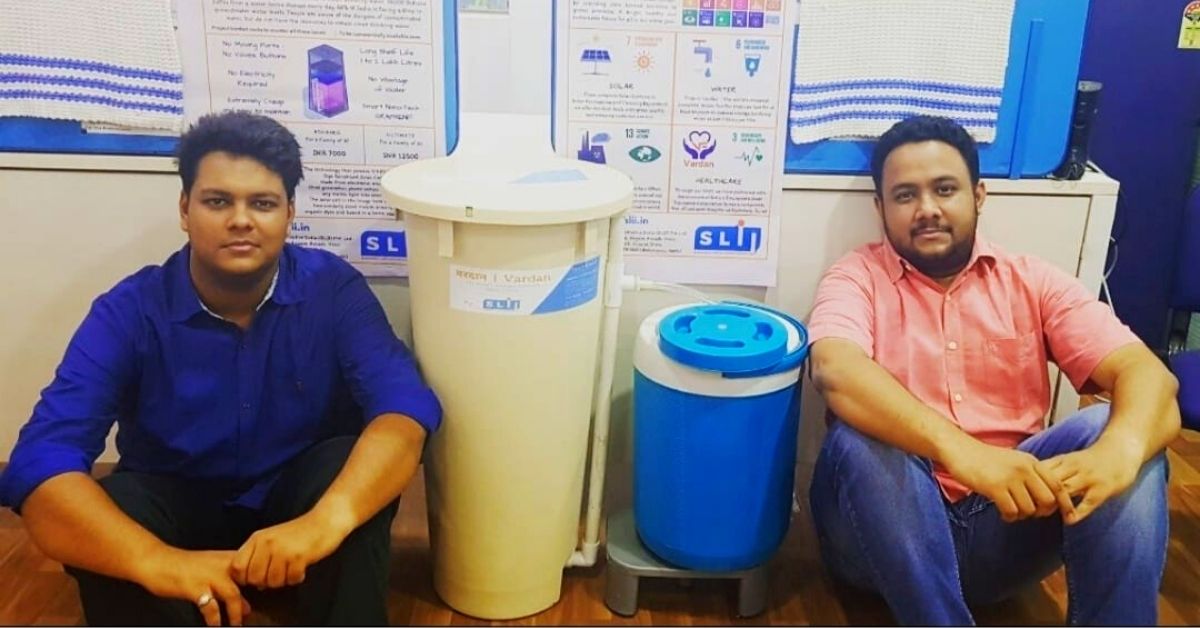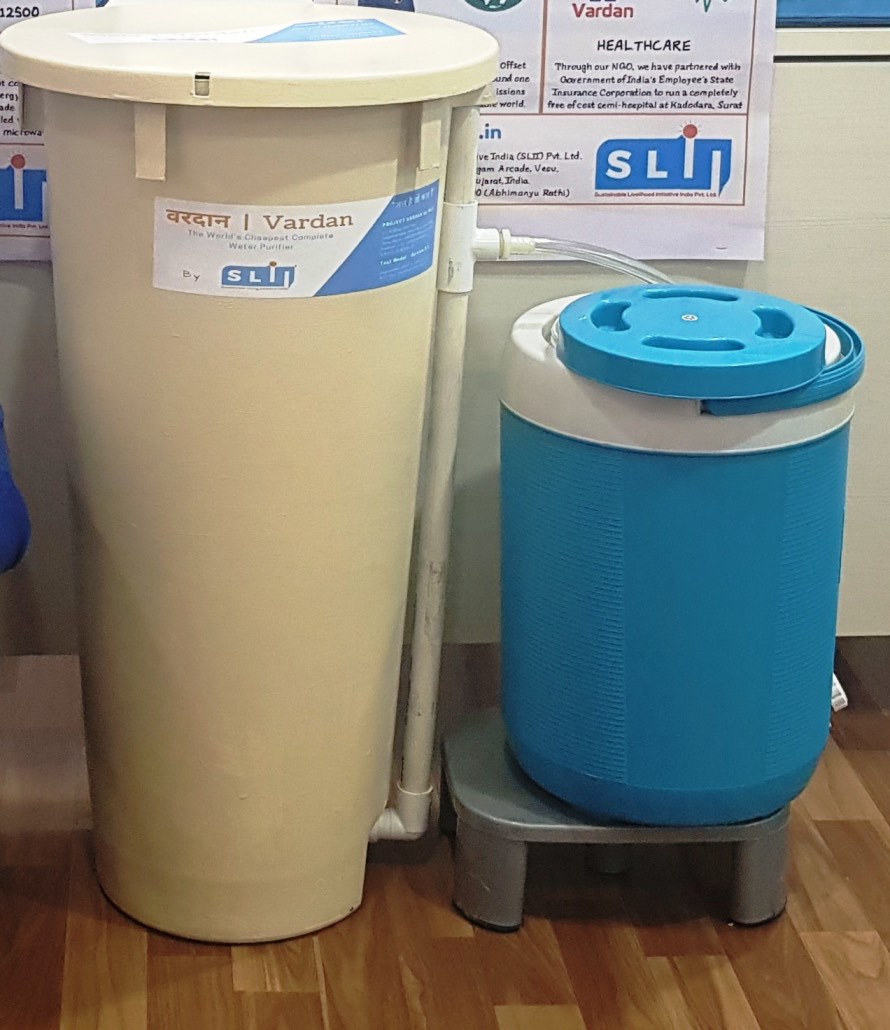Gujarat Startup’s Water Purifier Can Clean 1 Lakh Litres Of Water, Has Minimal Maintenance Cost
Abhimanyu and Vardan Rathi from Surat, Gujarat, launched Sustainable Livelihood Initiative India (SLII) to sell their innovation, a water purifier made from graphene and recycled cell phone screens

Having access to clean and affordable drinking water is akin to a luxury in India. Over 50% of the population does not have access to safe water for consumption. Besides imposing a health crisis, lack of clean water has caused several economic repercussions for the government.
According to the World Bank, 85% of rural India’s drinking water requirements are satisfied by groundwater sources. These vital resources are depleting, and witnessing contamination that is threatening the lives of both the rural as well as the urban population.
Solutions such as RO water purifying systems and other filters may seem like decent alternatives, but these are either costly, or negatively impact the environment. In fact, using RO purifiers does more harm than good, as the machines tend to waste more water than they treat.
However, two brothers from Suraj, Gujarat, have launched a unique solution to solve this crisis through their startup, Sustainable Livelihood Initiative India (SLII). They have created a water purifier that makes polluted water drinkable within minutes and has no movable parts, thus saving on maintenance and replacement. The system is named Vardan, and cleans water at 8 paise per litre, claiming to be the cheapest in India.
Abhimanyu Rathi, co-founder SLII, says it took nine years to build the product. The idea came to him around 2012, when he was pursuing chemical engineering. “While working on various projects during graduation, I realised that the issue of water was deeply rooted in the society. Water, or lack thereof, impacts everyone, irrespective of gender and location,” he says.
With recycled cell phone screens as solar cells

After he graduated in 2015, Abhimanyu launched the startup to formalise the product and build it commercially. In 2017, Vardan, his younger brother, also completed chemical engineering and became a co-founder. The siblings pursued a course on climate change to understand the issue.
They worked on finding solutions and experimented with different products. “We studied existing water purifiers available in the market, and most of them required electricity and maintenance costs. Both of these become a limitation in rural areas. Hence, we wanted to bring something that had no moving parts and had low maintenance costs,” Abhimanyu says.
He started experimenting with graphene, a derivative of carbon. “Graphene is a good adsorbent and works well as a filtering medium, due to its antibacterial properties. However, it is expensive. Consequently, we spent years developing a compound that served the purpose of water filtration, while being low-cost,” he says.
For removing other contaminants from water, a solar-powered UV light technique came to the rescue. The solar cell is made from recycled e-waste, Abhimanyu explains. “The cells are made from broken or discarded cell phone screens, and can pass electricity. These modified cell phone screens work as solar cells and power the UV light,” he adds.
After years of work, a cylindrical purifier with no membrane or moving parts was conceived. “The water requires no pump, and flows with the help of gravity,” Abhimanyu says, adding that the water purifier was named after his brother Vardan.
Vardan says a challenge the siblings faced was the lack of research funds. “We spent Rs 30,000 from our savings. I worked at a paint company and funded the project through the years. Abhimanyu worked full-time on the project. We also received grants from the state government in 2017 and loaned some amount from our family for the research,” he adds.
Minimal maintenance costs for 10 years

The product costs Rs 5,000 and can purify 1,00,000 litres of water in its lifetime, without replacing any parts, the brothers say. “With an average of purifying 40 litres per day, it would last for ten years and purify water at the rate of 8 paise per litre,” Vardan says, adding that not a single drop of water is wasted in the purification process.
Vardan tells The Better India that commercial RO products treated water at 16 paise, whilst gravity-based, non-electrical water purifiers performed the task at 20 paise per litre. “We compared the costs and efficiency of our innovation with eight others in the market, and the product turned out to be the cheapest purifier in India,” he adds.
Vardan says that samples tested from River Tapi showed significant improvement in water quality. Some of the findings were:
- The Total Suspended Solids (TSS) dropped from 75 ppm to less than 2 ppm, a total 97.50% reduction. TSS is the measure of fine, harmful particulate matter that remains in suspension.
- The Total Dissolved Solids (TDS) reduced from 4,000 ppm to 250 ppm. It showed a 93.75% reduction (Max). The elevated levels of TDS are responsible for giving the water a bitter, salty, or brackish taste.
The Chemical Oxygen Demand (COD) lessened from 350 ppm to 15 ppm, a 95.75% reduction. It’s the measure of organic and inorganic chemicals present in water. - The Biological Oxygen Demand (BOD), a calculation for microorganisms present in the water, decreased from 115 ppm to 3 ppm, which is about a 97.5% reduction.
- The turbidity of water, which affects its transparency property, showed a decline from 110 NTU to 0.15 NTU, a 99.85% improvement.
- The levels of chlorides, commonly used as disinfectants, can cause skin disease if used in high proportion. Its levels diminished from 1,400 ppm to 30 ppm, a 97.85% reduction.
- The process showed the removal of heavy metals such as arsenic, lead, cadmium, mercury, nickel and cobalt.
- The overall filtration showed 99.99% removal of pathogens, microbes and viruses that pose health risks.
Abhimanyu says the product, to be used in rural areas, will benefit the environment by saving tonnes of carbon emissions. “The majority of rural India relies on boiling water for drinking, to kill the bacteria and germs, as well as make it potable. The use of wood fire for the purpose causes 0.5 kg of carbon emissions per litre of water boiled. Using the water purifier would save 5-8 tonnes of carbon emissions annually, equal to the job of about 300 mature trees purifying the air,” he adds.
A hassle-free innovation
Watch how water is purified in minutes

The product was commercially made available in 2020, and 30 units were sold in Surat, Navsari and Ankleshwar cities of Gujarat. “We are working on 70 deliveries and have work orders for over 5,000,” Abhimanyu says.
One of the users, Jignesh Modi, an HR and administrator at a government hospital, says, “I was using an RO purifier before this, and was introduced to the new product a little over a year ago. The annual maintenance for the RO purifier cost me Rs 3,000, added with other expenses for filter and repairs. The Vardan purifier is hassle-free and has not cost me any maintenance. Regular checks are conducted for its efficiency, but no issues have cropped up so far.”
Another user, Jigar Nanda, says problems such as salinity and bitter taste have been resolved with the new water purifier, which he bought for his five-member family. “It requires no electricity and serves the needs of the family. The water quality in Surat is poor. The salt deposits form a hard water line in the filters and demand frequent replacements. But the Vardan water purifier has not resulted in any such issues,” he adds.
Nirmalya Ballav, a senior scientist at the Indian Institute of Science Education and Research (IISER), says, “Graphene is non-toxic and works efficiently in the water purification process. The use of graphene is increasing, and it has been commercially used in the UK.” https://www.waterworld.com/international/potable-water/article/16203074/graphene-water-filter-commercialisation-speeds-up-in-uk
SLII is exploring opportunities to seek seed investments for mass commercialisation of the product. “The product is available with two other variants of higher capacity, which can purify 1.5 lakh litres of water and 2.5 lakh litres of water,” Abhimanyu says.
To order the water purifier, Abhimanyu can be contacted at 9925629000.
If you found our stories insightful, informative, or even just enjoyable, we invite you to consider making a voluntary payment to support the work we do at The Better India. Your contribution helps us continue producing quality content that educates, inspires, and drives positive change.
Choose one of the payment options below for your contribution-
By paying for the stories you value, you directly contribute to sustaining our efforts focused on making a difference in the world. Together, let’s ensure that impactful stories continue to be told and shared, enriching lives and communities alike.
Thank you for your support. Here are some frequently asked questions you might find helpful to know why you are contributing?


This story made me
-
97
-
121
-
89
-
167













